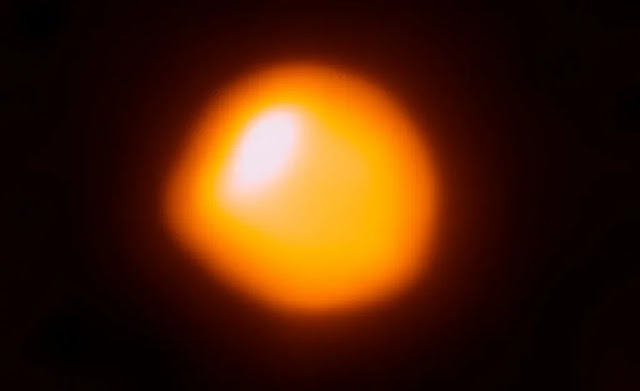Betelgeuse, also known as Alpha Orionis, is currently in its terminal phase of core carbon burning and may have a supernova within our lifetime, according to recent study.
Betelgeuse: A Supernova Waiting to Happen
Nearly 650
light-years from Earth, the red supergiant star Alpha Orionis is about to come
to a spectacular conclusion. This star, renowned for its pulsations and
remarkable brightness, may be on the verge of a supernova explosion during our
lifetime, according to recent study. When it happens, this phenomenon will rank
among the most important astronomical occurrences of the century.
The Pulsating Giant
Due to its unpredictable brightness variations, Betelgeuse, one of the biggest stars that can be seen with the unaided eye, has drawn a great deal of astronomical interest. The star's outer layers pulse rhythmically, causing it to expand and contract and altering its brightness. The regular cycles of these pulsations have been seen to be 185, 230, 420, and 2,200 days, with other less predictable variations.
A dust
eruption contributed to the big dimming of 2019–20, although it was also a
result of many cycles' troughs occurring at the same time. This star is a
special focus of research for astronomers because of its pulsing, immense size,
and close proximity to Earth.
The Countdown to Explosion
Perhaps the star's
brightness has changed more recently than we initially assumed. According to a
preprint study, when the carbon in the red giant's core runs out, it will only
take a few decades for it to erupt.
According to
the study, the star is not only consuming carbon, but it is also beginning to
run out. The end is just a few decades away once the carbon-burning phase is
through. If this discovery is confirmed, it may provide us a once-in-a-lifetime
chance to see a supernova explosion.
The
Uncertainty of Timing
Alpha Orionis
is predicted to explode within our lifetimes, but the precise date is still
unknown. Either millions of years or a few decades could pass before the star
explodes.
The ambiguity
results from the difficulties in pinpointing the precise size and life stage of
the star. Its brightness has recently changed, though, and the most current
scientific findings indicate that the explosion might occur sooner rather than
later.
It will be a
stunning event when Alpha Orionis explodes as a galactic supernova, giving
astronomers a rare chance to observe a supernova up close. We will surely learn
more about the birth and death of stars as we keep watching Alpha Orionis,
which will further our knowledge of the cosmos.
Reference(s): Research Paper- Arxiv



.jpg)


.jpg)
.png)

1 Comments
It probably has already exploded, we just will not know it for 650 years it takes to see it. Not in my life time.
ReplyDelete